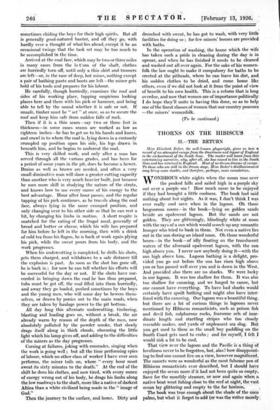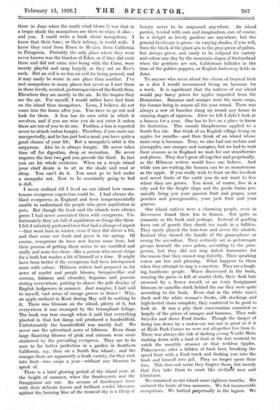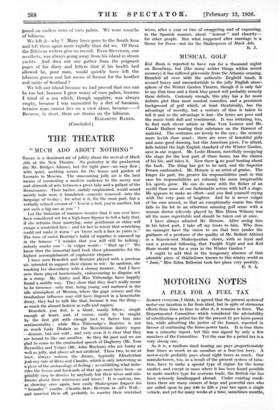Mi88 Elizabeth Baker, the well-known playwright, gives us here a:
record of an attempted escape from the dreariness and rigour of England, to the enchantment of the South Seas. The reader will learn from this entertaining narrative, why, after all, she has ceased to live in the Sotethi Seas and has returned to England. Most of us dream dreams of escape.! To those who are still in the dream stage, Miss Baker's disillusionment may bring some doubts, and therefore, perhaps, some consolation.
WONDROUS white nights when the moon rose over the peaked hills and sailed high in a purple sky out over a purple sea ! How much more tO be enjoyed if they had brought a little coolness. The book had said nothing about hot nights. As it was, I don't think I was ever really cool save when in the lagoon. Oh those languorous noonsL---in the book—lying on golden sands beside an opalescent lagoon. But the sands are not golden. They are glitteringly, blindingly white at noon with the rays of a sun which would scorch up any romantic lounger who tried to bask in them. Not even a native lies out in the sun during an island noon. Oh those wonderful hours—in the book—of idly floating on the translucent waters of the aforesaid opalescent lagoon, with the sun high above you. I never saw anybody doing it—with the sun high above him. Lagoon bathing is a delight, pro:- vided you go out before the sun has risen high above you or has passed well over you and is down in the West. And provided also there are no sharks. We were lucky in our lagoon. It was too shallow for them. It was also too shallow for canoeing, and we longed to canoe, but one cannot have everything. To have had sharks would certainly have spoilt bathing and might also have intei- fered with the canoeing. Our lagoon was a beautiful thing, but there are a lot of curious things in lagoons never mentioned by Hibiscus romanticists, such as poison fish and devil fish, sulphurous rocks, fearsome .eels_ of inor- dinate length and startling stripes who too closely resemble snakes, and yards of unpleasant sea slug. BUt you, get used to these as the small, boy paddling on the South Coast gets used to crabs ; and for myself, I felt J would risk a lot to be cool.
• That view over the lagoon and the Pacific is. a thing Of loveliness never to be forgotten, but, alas ! how disappoint- ing to find one cannot live on a view, however magnificent. The sunsets were as wonderful as the most fulsome pen Of Hibiscus romanticists ever described, but I should have enjoyed the ocean more if it had not been quite so empty. Save for the monthly steamer, 'or now and again when a native boat went fishing close to the reef at night, the vast ocean lay glittering and empty to the far horizon. The book was true enough about the shade 'of the coc. . . . . _ _ . palms, but what it forgot to add (or was the writer merely; there in June when the south wind blows ?) was that in a tropic shade the mosquitoes are there to enjoy it also— and you. I could write a book about mosquitoes. I know that their fame, or their infamy, is world wide. I know they exist from Essex to Mexico, from California to Patagonia. Probably the only place where they were never known was the Garden of Eden, or if they did exist there and did not come into being with the Curse, were merely playful and sang happily as they sat on Eve's neck. But an evil is no less an evil for being general, and it may easily be worse in one place than another. I've met mosquitoes in many places but never as I met them in those lovely, scented, picturesque isles of the South Seas. Elsewhere they are merely in the air. In the tropics they are the air. For myself, I would rather have had lions on the island than mosquitoes. Lions, I believe, do not come into the house after you. You have to go out and look for them. A lion has its own orbit in which it revolves, and if you are wise you do not enter it unless there are ten of you to its one. Further, a lion is reported never to attack unless hungry. Therefore, if you meet one unexpectedly, and he has just had a meal, you have quite a good chance of your life. But a mosquito's orbit is the empyrean. Also he is always hungry. He never takes time off for digestion, sleep or recreation. He never requires the first two itnd you provide the third. In fact you are his whole existence. When on a tropic island your chief desire is to sit in the shade and read or sleep. You can't do it. You must go to bed under a mosquito net. Now to be constantly going to bed is dull.
I never realized till I lived on our island how mono- tonous evergreen vegetation could be. I had always dis- liked evergreens in England and been temperamentally unable to understand the people who grew aspidistras in pots. But though the book said the islands were always green I had never associated them with evergreens. Un- fortunately they are full of aspidistras or things like them I felt I infinitely preferred trees that had a change of aspect —that went bare in winter, even if they did shiver a bit, and then came out fresh and green in the spring. Of course, evergreens do have new leaves some time, but their process of getting them seems to me muddled and stuffy and none too clean—like a person who never strips for a bath but washes a bit of himself at a time. It might have been better if the evergreens had been interspersed More with colour. Hibiscus writers had prepared us for acres of scarlet and purple blooms, bougainvillae and crotons, hibiscus and oleander, begonias and jasmine rioting everywhere, putting to shame the pale display of English hedgerows in summer. Just imagine, I had said to myself, vast areas- of orange groves in flower ! Why, an apple orchard in Kent during May will be nothing to it. There was blossom on the island, plenty of it, but • everywhere it was swamped by the triumphant foliage. The book was true enough when it said that everything planted in that hot damp soil produced a hundredfold. Unfortunately the hundredfold was mainly leaf. We • never saw the advertised acres of hibiscus. Even those • large flaunting blooms of pink and crimson were over- shadowed by the prevailing evergreen. They are ti be seen to far better perfection in a garden in Southern California, say, than on a South Sea island ; and the oranges there are apparently a freak variety, for they rush into fruit—two crops a year—without any blossom to speak of. There is a brief glowing period of the island year, at the height of summer, when the flamboyants and the frangipanni are out. An avenue of flamboyant trees with their delicate leaves and brilliant scarlet blossoms akitinst the burning blue of the tronical sky is 'a think of - . - beauty never to be surpassed anywhere. An island garden, tended with care and imagination, can, of course, be a delight as lovely gardens ate anywhere, but the general landscape is green—in varying shades, if you will, from the black of the giant utu to the grey-green of palms, but always green, and easily to be eclipsed for variety and colour any day by the mountain slopes of Switzerland when the gentians are out, Californian hillsides in the time of the golden poppies, or English buttercup fields in ' June.
To anyone who raves about the charm of tropical fruit as a diet I would recommend living on bananas for a week. It is significant that the natives of our island would pay fancy prices for apples imported from the Dominions. Bananas and oranges were the main crops, the former being in season all the year round. There was always a row of bunches slung up round any house in varying stages of ripeness. After we left I didn't look at a banana for a year. One has to live on a place to know its limitation. This sounds blasphemous applied• to .a • South Sea isle. But think of an English village living on apples for months—and then think of an island whose main crop is bananas. True, we also had our melons and pineapples, our oranges and mangoes, but we had to Wait their seasons as in England we wait for our strawberries and plums. They don't grow all together and perpetually, as the Hibiscus writers would have one believe. And while you are waiting, the banana can be as monotonous as the apple. If you really wish to feast on the loveliest and rarest fruits of the earth you do not want to live where they are grown. You must, of course, live ih a city and let the freight ships and the goods trains pro- saically bring you your passion fruit and grapes, your peaches and pomegranates, your jack fruit and your guavas.
Our island natives were a charming people, even AS Stevenson found their kin in Samoa. Not quite so romantic as the book said perhaps. Instead of quaffing kava out of gourds they drank tea made in a billikin. They rarely played the tom-tom and never the ukulele.
Instead they turned the handle of-the gramophone or swung the accordion. They certainly sat in picturesque groups beneath the coco palms, according to the pros- pectus, but they did not sing dulcet harmonies for the reason that they cannot sing dulcetly. Their speaking voices are low and pleasing. What happens to them when they attempt to sing is a mystery. They are a laugh- ing, handsome people. When discovered in the bush, wearing the pariu or kilt of scarlet cloth, their dark 'hair crowned by a flower wreath or an ivory frangipanni blossom or camellia stuck behind the ear they were quite according to the book. Even clad in the white man's duck and the white woman's frocks, silk stockings and high-heeled shoes complete, they contrived to be good to look at. It was a pity their conversation consisted so largely of the prices of oranges and bananas. They rode bicycles and drove Ford trucks. Though the danger of being run down by a motor-car was not so great as it is at Hyde Park Corner we were not altogether free from it. There was always the risk of dashing young N'ariki Mats rushing down with a load of fruit at the last moment to catch the monthly steamer or that reckless tippler, Pukavaevae, after a billikin of bush beer, breaking the speed limit with a Ford truck and dashing you into the bush and himself into jail. They no longer spear their foes. This does not mean they forgive theml but merely that they take them to court like civiliztrd men and - Christians.
We remained on our island some eighteen months. We endured the heats of two summers. We fed innumerable mosquitoes. We bathed perpetually in the lagoon. We gazed on endless rows of coco palms. We wore wreaths of hibiscus.
We left it—why ? Many have gone to the South Seas and left them again more rapidly than did we. Of these the Hibiscus writers give no record. Even Stevenson, one recollects, was always going away from his island in steam yachts. And does not one gather from the poignant pages of his diary and letters that if his health had allowed he, poor man, would quickly have left the hibiscus groves and hot noons of Samoa for the heather and mists of Scotland ?
We left our island because we had proved that one can be too hot, because I grew weary of coco palms, because I tired of a sea which, though sapphire, was always empty, because I was nauseated by a diet of bananas, because man cannot live on a view alone, because—? Because, in short, there are thorns on the hibiscus.
(Concluded.)
ELIZABETH BAKER.




















































 Previous page
Previous page